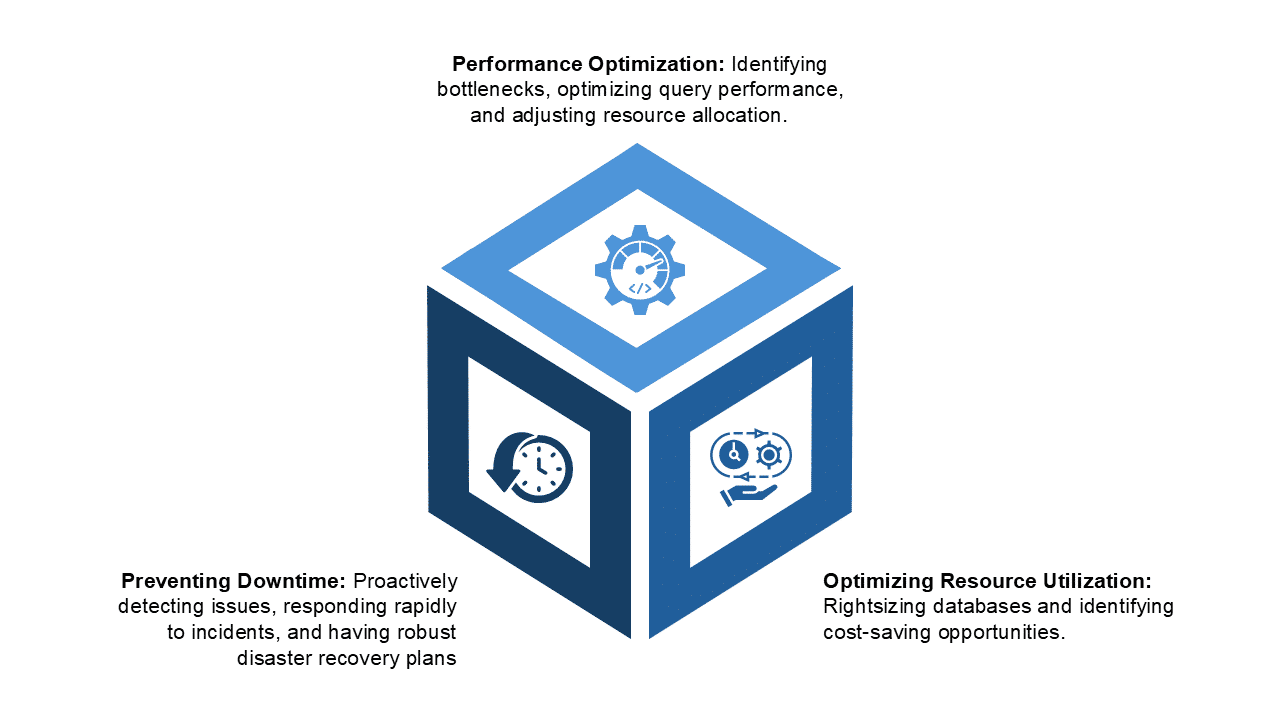The Imperative of Cloud Database Monitoring for Global Enterprises
The Imperative of Cloud Database Monitoring for Global Enterprises

In today’s digital age, global enterprises heavily rely on cloud databases to power their critical applications. These databases store vast amounts of sensitive data, and their performance, and availability are paramount to business success. However, as the complexity of cloud environments grows, so does the need for robust database monitoring.
Analyst Insights on Cloud Database Monitoring
Industry experts like Gartner and Forrester highlight several challenges in managing databases in today’s cloud environment. Firstly, cloud setups are becoming increasingly complex, making it difficult to keep track of and manage databases efficiently. Secondly, the rise of cloud-native databases, while offering scalability and flexibility, demands specialized tools for monitoring. Thirdly, proactive monitoring is crucial to prevent unexpected outages and minimize downtime, leading to significant cost savings. Lastly, real-time monitoring is essential for quickly identifying and resolving issues, ensuring smooth operations.
Why is Cloud Database Monitoring Crucial?
Cloud database monitoring is essential for:
Performance Optimization:
Database performance optimization is crucial for ensuring the smooth operation of applications and maximizing resource utilization. By monitoring key performance metrics like CPU usage, memory consumption, disk I/O, and query response times, administrators can identify bottlenecks that may be hindering performance. Analyzing query execution plans allows for the identification of opportunities to optimize queries through techniques such as indexing, query rewriting, or partitioning. Additionally, dynamically adjusting resource allocation based on fluctuating workloads helps maintain optimal performance while avoiding unnecessary costs. By proactively addressing performance issues, organizations can improve overall system responsiveness, enhance user experience, and reduce operational expenses.
Prevent Downtime:
Preventing downtime is a critical aspect of database management, as it ensures business continuity and minimizes potential financial losses. By proactively monitoring database health, administrators can identify and address potential issues before they escalate into outages. Implementing automated alerts and notifications enables rapid response to incidents, minimizing downtime and accelerating recovery efforts. Additionally, developing and regularly testing robust disaster recovery plans ensures business continuity in the event of catastrophic failures. By combining these proactive measures, organizations can significantly reduce the risk of downtime, safeguarding their critical data and applications.
Optimize Resource Utilization:
Optimizing resource utilization is crucial for achieving cost-efficiency and maximizing performance in database environments. By closely monitoring resource usage, organizations can avoid overprovisioning, which leads to unnecessary costs, and under provisioning, which can result in performance degradation. Analyzing resource consumption patterns allows for the identification of opportunities to rightsize databases, ensuring that they have the appropriate resources to meet their specific needs. Additionally, optimizing database configurations, such as indexes, query plans, and memory settings, can significantly reduce costs without compromising performance. By implementing these strategies, organizations can achieve a balance between cost-effectiveness and performance, maximizing the return on their database investments
How UnityOne.ai Platform Can Help
The UnityOne.ai platform empowers enterprises with a comprehensive solution for cloud database monitoring. Here’s how it plays a vital role:
- Unified Visibility Across Platforms: UnityOne.ai unifies monitoring across diverse cloud environments, including public clouds (AWS, Azure, GCP, OCI) and private clouds (VMware, OpenStack, Hyper-V). This eliminates the need for multiple monitoring tools and provides a single pane of glass for managing all your databases.
- Real-Time Insights and AI-Powered Analysis: The platform delivers real-time insights into database health and performance. Its AI capabilities go beyond basic monitoring by analyzing trends, identifying anomalies, and predicting potential issues before they escalate.
- Proactive Issue Detection and Alerting: UnityOne.ai proactively scans your databases for performance bottlenecks, and configuration errors. It triggers automated alerts, notifying you of potential problems so you can address them promptly.
- Automated Optimization and Resource Management: UnityOne.ai can analyze query performance, identify slow-running queries, and recommend optimization strategies. Additionally, it helps you optimize resource allocation by rightsizing databases based on actual usage, leading to cost savings.
Benefits of Leveraging UnityOne.ai for Database Monitoring
By utilizing UnityOne.ai’s platform, enterprises can achieve significant benefits:
- Improved Performance: Faster response times and a better user experience through optimized database operations.
- Reduced Downtime: Minimize downtime and business disruptions with proactive monitoring and rapid response capabilities.
- Lower Costs: Optimize resource utilization and identify cost-saving opportunities for your databases.
- Simplified Management: Gain a unified view, reduce complexity, and automate tasks for efficient database management.
Conclusion
Investing in a robust cloud database monitoring solution like UnityOne.ai empowers global enterprises to safeguard critical data, minimize downtime, and optimize performance. By proactively addressing database issues and leveraging AI-powered insights, organizations can mitigate risks and ensure the long-term success of their business.
Contact UnityOne.ai today to learn more about our comprehensive database monitoring solutions and how we can help your organization achieve optimal database performance, and compliance.



